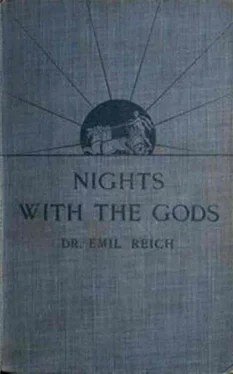Emil Reich - Nights with the Gods
Здесь есть возможность читать онлайн «Emil Reich - Nights with the Gods» — ознакомительный отрывок электронной книги совершенно бесплатно, а после прочтения отрывка купить полную версию. В некоторых случаях можно слушать аудио, скачать через торрент в формате fb2 и присутствует краткое содержание. Жанр: unrecognised, на английском языке. Описание произведения, (предисловие) а так же отзывы посетителей доступны на портале библиотеки ЛибКат.
- Название:Nights with the Gods
- Автор:
- Жанр:
- Год:неизвестен
- ISBN:нет данных
- Рейтинг книги:5 / 5. Голосов: 1
-
Избранное:Добавить в избранное
- Отзывы:
-
Ваша оценка:
- 100
- 1
- 2
- 3
- 4
- 5
Nights with the Gods: краткое содержание, описание и аннотация
Предлагаем к чтению аннотацию, описание, краткое содержание или предисловие (зависит от того, что написал сам автор книги «Nights with the Gods»). Если вы не нашли необходимую информацию о книге — напишите в комментариях, мы постараемся отыскать её.
* Aristotle on Specialism in England
* Diogenes and Plato on Tolstoy, Ibsen, Shaw, etc.
* Alcibiades on Women in England
* Caesar on The House of Commons
* Apollo and Dionysus in England
* Socrates, Diogenes, and Plato on Religion
Nights with the Gods — читать онлайн ознакомительный отрывок
Ниже представлен текст книги, разбитый по страницам. Система сохранения места последней прочитанной страницы, позволяет с удобством читать онлайн бесплатно книгу «Nights with the Gods», без необходимости каждый раз заново искать на чём Вы остановились. Поставьте закладку, и сможете в любой момент перейти на страницу, на которой закончили чтение.
Интервал:
Закладка:
"'Well, this man Aristotle (for, we have not yet pluralised him, although I—but this would pass your horizon, my young friend)—this clever man has left us, amongst other works, one called "Politics." It is not wanting in quality, and it is said, if with certain doubts, that there are a few things to be learnt from it. It is, of course, also said that no professor has ever learnt them. But this is mere calumny. Look at their vast commentaries. Of course, how can one accept some of the glaring fallacies of Aristotle? Imagine, that man Aristotle wants us to believe that nearly all Greek states were founded, equipped with a constitution, and in a word, completely fitted out by one man in each case. Thus, that Sparta was founded, washed, dressed, fed, and educated by one Lycurgus. How ridiculous!
"'Having proved, as we have, that Homer's poetry, a mere book, was made by a Joint Stock Company, Unlimited, how can we admit that a big and famous state like Sparta was ordered, cut out, tailored, stuffed and set on foot by one man? Where would be Evolution? If a state like Sparta was made in the course of a few months by one man, what would Evolution do with all the many, many years and ages she has to drag along? Why, she would die with ennui, bored to death. Can we admit that? Can one let Evolution die? Is she not a nice, handy, comely Evolution, and so useful in the household that we cannot be happy until we get her? To believe in a big, important state like Sparta having been completely established by one man is like saying that my colleague, the Professor of Zoology, taking a shilling bottle of Bovril, has reconstituted out of its contents a live ox walking stately into his lecture-room. Hah-hah-hah! Very good joke. (Secretary! Put it into my table-talk! Voltairian joke! serious, but not grave.)
"'Now, you see, my young friend, in that capital point Aristotle was most childishly mistaken; and even so in many another point. We have definitely done away with all state-founders of the ancients. Romulus is a myth; so is Theseus; so is Moses; so is Samson (not to speak of Delilah); so is everybody who pretended to have founded a city-state. Since he never existed, how could he have founded anything? Could I found a city-state? Or any state, except a certain state of mind, in which I say that no single man can found a city-state? Could I? Of course, I could not. Well then, how could Lycurgus? Was he a LL.D.? Was he a member of the British Academy? Was he a professor at Oxford? Had he written numerous letters to The Times? Was he subscriber to so respectable a paper as The Spectator? It is ridiculous to speak of such a thing. Lycurgus founding Sparta! It is too amusing for words. These are all myths. Whatever we cannot understand, we call a myth; and since we do not understand many things, we get every day a richer harvest of myths. We are full of them. We are the real living mythology.'
"To this long oration," Aristotle continued, "I retorted as calmly as I could, that we Greeks had states totally different from those of the moderns, just as the latter had a Church system absolutely different from our religious institutions; so that if anyone had tried to persuade an Athenian of my time that a few hundred years later there would be Popes, or single men claiming and obtaining the implicit obedience of all believers in all countries, the Athenian would sooner have gone mad than believe such stuff. For, to him, as a Greek, it must have seemed hopelessly incredible that an office such as that of the universal Pope should ever be tolerated; or, in other words, that a single man should ever be given such boundless spiritual power. I said all that with much apparent deference; but my professor got more and more out of control.
"'What,' said he, 'what do you drag in Popes for? We talk of Lycurgus, not of Popes. Was Lycurgus a Christian? Let us stick to the point. The point is that Lycurgus never existed, since so many professors, who do exist beyond doubt, deny his historical existence. Now, either you deny the existence of these professors, which you can't; or you deny that of Lycurgus, which you must. Existence cannot include non-existence. For, non-existence is, is it not?—the negation of existence. And since the professors exist, their non-existence would involve us in the most exasperating contradictions with them, with ourselves, and with the daily Press. This, however, would be a disaster too awful to be seriously thought of. Consequently, Lycurgus did not exist; nor did any other state-founding personality in Greek or Roman times.
"'In fact when you come to think of it, nobody ever existed except ourselves. Adam was not; he will be at the end of ends. The whole concept of the world is wrong as understood by the vulgar. Those old Greek and Roman heroes, like Aristomenes, Coriolanus, Cincinnatus, never existed for a day. Nor did the Doric Migration, the Twelve Tables, and lots of other so-called events. They have been invented by schoolmasters for purposes of exams. Did Draco's laws ever exist? Ridiculous. That man Aristotle speaks of them, but it is as evident as soap that he invented them for mods. or other exams. of his.
"'The vulgar constantly ask me whether or no history repeats itself. What, for goodness' sake, does that matter to me? It is sufficient for all purposes that historians repeat each other, for it is in that way that historical truth is established. Or do not the great business-princes thus establish their reputation? They go on repeating "Best furniture at Staple's," "Best furniture at Staple's," three hundred and sixty-five times a year, in three hundred and sixty-five papers a day. By repetition of the same thing they establish truth. So do we historians. That's business. What, under the circumstances, does it matter, whether history itself does or does not repeat itself?
"'One arrogant fellow who published a wretched book on "General History," thought wonders what he did not do by saying, that "History does repeat itself in institutions, but never in events or persons." Can such drivel be tolerated! Why, the repetition by and through persons (read: historians) is the very soul of history. We in this country have said and written in and out of time and on every sort of paper, that the "Decline and Fall of the Burmese Empire" is the greatest historical work ever written by a Byzantine, or a post-Byzantine. We have said it so frequently, so incessantly, that at present it is an established truth. Who would dare to say that it is not? Why, the very Daily Nail would consider such a person as being beneath it.
"'We real historians go for facts only. Ideas are sheer dilettantism. Give us facts, nothing but single, limited, middle-class facts. In the Republic of Letters we do not suffer any lordly ideas, no more than the idea of lords. One fact is as good as another, and far worse. Has not our greatest authority taught that the British Empire was established in and by absent-mindedness, that is, without a trace of reasoned ideas? As the British Empire, even so the British historians, and, cela vo sang dir, all the other historians. Mind is absent. "Mind" is a periodical; not a necessity. We solid researchers crawl from one fact to another for crawling's sake.'"
The gods and heroes were highly amused with the tale of Aristotle, and it was with genuine delight that they saw him resume the story of his experiences at the seats of learning. "When I left the Professor of History," continued Aristotle, "I felt somewhat heavy and dull. I could not easily persuade myself that such utter confusion should reign in the study of history after so many centuries of endless research. I hoped that the little ones might have made more real advance in philosophy; and with a view to ascertain the fact, I entered a lecturing hall where a professor was even then holding forth on my treatise 'De Anima.' He had just published a thick book on my little treatise, although (or perhaps because?...) another professor, a Frenchman, had recently published a much thicker book on it.
Читать дальшеИнтервал:
Закладка:
Похожие книги на «Nights with the Gods»
Представляем Вашему вниманию похожие книги на «Nights with the Gods» списком для выбора. Мы отобрали схожую по названию и смыслу литературу в надежде предоставить читателям больше вариантов отыскать новые, интересные, ещё непрочитанные произведения.
Обсуждение, отзывы о книге «Nights with the Gods» и просто собственные мнения читателей. Оставьте ваши комментарии, напишите, что Вы думаете о произведении, его смысле или главных героях. Укажите что конкретно понравилось, а что нет, и почему Вы так считаете.












